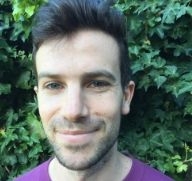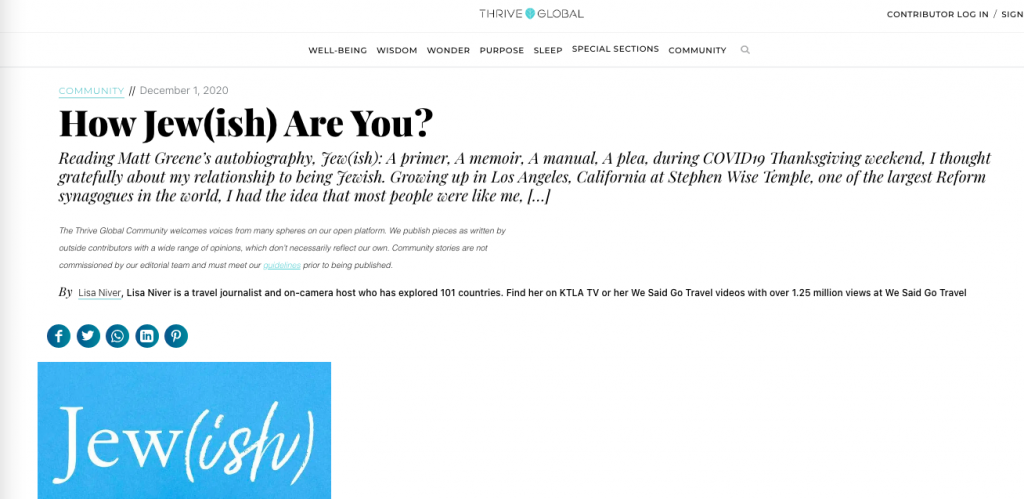
Thank you to Thrive Global for publishing my article, “How Jew(ish) Are You?”
Reading Matt Greene’s autobiography, Jew(ish): A primer, A memoir, A manual, A plea, during COVID19 Thanksgiving weekend, I thought gratefully about my relationship to being Jewish. Growing up in Los Angeles, California at Stephen Wise Temple, one of the largest Reform synagogues in the world, I had the idea that most people were like me, Jewish. It would come as a shock to learn that Jews were only a small part of the population when I left my LA enclave.

Greene explains: “We’re very explicit that we’re proud British Jews: we’re proud British people and we’re proud Jewish people.” In fact, his family had been in Britain so long that he had “two great-grandfathers who fought for Britain in the First World War.”
I remember being asked at Hebrew School, if I was an American Jewish Woman or an American Jew or a Jewish American? They wanted us to answer, “What would you fight for? Which are the most important parts of you?” I went to an all girl’s high school and we talked often about Women’s Rights and the ERA. At Hebrew School, we often talked about the legacy of the Holocaust and importance of dating Jewish and increasing the number of Jews in the world.
About growing up Jewish, Greene says, “I hated being Jewish in the way I hated being short. There seemed to be no advantage to be gained.” Greene participated in temple only as long as was required through his Bar Mitzvah, unlike him, I was mesmerized. I loved services, the songs, Jewish summer camp and being in Jewish youth group.
Like Greene, I went on a teen tour to Israel but my experience changed my life and is the reason that I am a travel journalist obsessed with traveling. He was not as impressed. His dad told him: “The thing about being Jewish is you always need to be vigilant. If you think you’re safe, you’re probably being complacent. That’s why we need a Jewish state, so there’s somewhere we can go if the shit ever hits the fan again.” Terrible things have happened to the Jews again and again. The question is what is our responsibility in our time? How will we impact our country and our world?
Greene’s book begins with a discussion of his son who is born to a non-Jewish mother. Once he has a child, he contemplates if belonging to the Jewish tradition is important to him. What does it mean to be Jewish?
He discusses the anti-semitism in England and being the only Jew at college. I went to the University of Pennsylvania in part for the large Jewish community. At Hillel on Shabbat, we had four services going for different types of Jews. Everyone was welcome and I never worried about discrimination there.
When he returns from college, his family asks him, “And do you tell people you’re Jewish?” It can be challenging to navigate being assimilated into society while being perceived as an other. Greene asks, “What is race? What is whiteness? Gone if not forgotten are the days when Jews were banned from clubs and institutions on the back of their Jewishness and like most (but not all) Jews, I benefit from white privilege in ways too many to enumerate and probably in ways I haven’t even noticed.”
When I first started working on cruise ships, there were very few women on the crew. Later, I would realize that I was often the only Jew on my team or even in a crew of 1200. It was the first time I felt so singled out and different. One British Cruise Director told the rest of my team, “Lisa, can’t do that; she’ll be at snip-dick ceremonies.” It took me several beats to understand that he was referring to Shabbat services. I led them on Friday nights and he was talking about Jews. It was not the only time people said anti-Semitic things to me. One crew member told me that I did believe in Jesus. I said, “No, Jesus is when your religion left my religion.” He told me, “If my dad was here, he would make you understand that you do love Jesus.” I said, “Lucky for me, he is not.”
Mostly when I was traveling or working on ships, no one knew I was Jewish. As Greene describes in his book, I could choose to pass as white and not “different.” It is not obvious from my last name that I am Jewish because as Greene discusses about his family as well, our name was changed. There are many choices we make wandering in the world. When traveling in Asia when President Bush was in office, we often said we were Canadians. We did not want to be embroiled in the political drama of that time. We were able to pass. Some people even sewed Canadian flags on their backpacks.
Greene explains: “For whatever reason, for any reason, for no reason at all, to be Jewish is to live with the knowledge that no matter who you are or what you do there are people who will hate you.” For his 34th birthday, Greene chose to participate in the March of the Living in Poland. My trip to Poland, after a semester in Israel, was also challenging. It was hard to walk in small towns and see so many former synagogues and Jewish schools and realize how many Jews were murdered in the Holocaust. The area was full of Jewish life which was decimated in camps like Auschwitz and Birkenau.
As Greene relates, “The year 2020 is a strange time to be a Jew, even, or perhaps especially, a lapsed, secular one. At once we’re witnessing a resurgence of the far right, an uptick in anti-Semitic attacks, a refugee crisis of a scale unknown since the Second World War and, maybe most crucially for the question this book primarily concerns itself with, the end of the generation who witnessed the horrors of the Holocaust first-hand. In this context it seems important to understand what it means to be Jewish – and personally what it means to me that, technically, my son is not.”
Greene shares his search to find a place for himself and his son. He asks his grandparents, “Is my son Jewish?” and they answer together, “Of course, he’s our family.”

We live in complicated and confusing times and I agree with him that we need to recognize persecution and oppression. Greene closes by saying:
“We need to find a way to unite around our common humanity without erasing or downplaying the particularities of any group’s experience. If we’re to confront the challenges that face us as a species and triumph over those who seek to divide and deceive us, we need to realise we’re all in this together. The question of Jewishness is a good place to start. We’re not all Jews but we’re all Jew-ish.”

